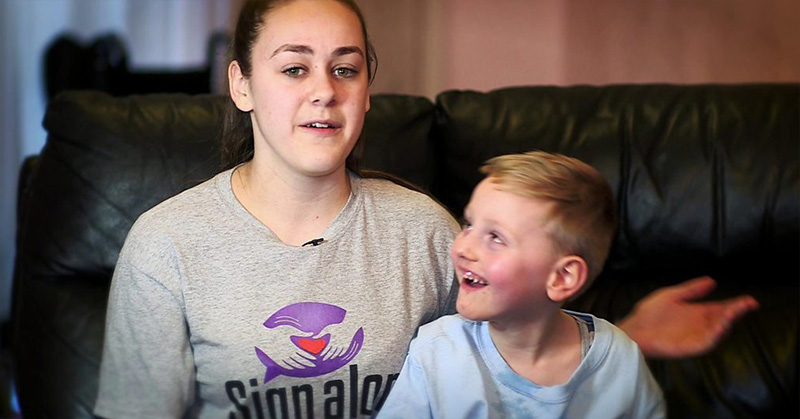Imagine the excitement you would feel on the day your baby brother is being born. Not only can you not wait to meet them, but your head begins to fill with ideas about all the fun things you will do together as you get older.
Now imagine being told that your new baby brother sustained serious brain damage during the birthing process and will most likely never be able to communicate with you.
This is the news that Jade Kilduff received shortly after the birth of her brother Christian. She refused to give up on her little brother, and what the two of them have achieved is nothing short of spectacular.
A different way to communicate
Christian Kilduff was born with Non-verbal Cerebral Palsy. Jade decided to learn sign language and teach it to her brother so that they can communicate. (1)
“At first we were told he would never be able to communicate or even understand what we were saying.” Jade explained to The Daily Mail UK. “As he got older he would be frustrated because he wanted to tell us what he wanted so it would be frustrating to see him get so upset.” (1)
Now she is 17 and Christian is 4, and they have a YouTube channel called Sign Along With Us where they sign along to popular songs to spread awareness and teach others sign language. (1)
Since their first video the pair have become an internet sensation with people tuning in from all over the world. (1)
Read: Nurse Places Dying Newborn next To Her Twin, Ends up Giving Her a Hug That Saves Her Life
Fame for a good cause
Using their newfound celebrity, Jade is campaigning to have sign language be taught in elementary schools. So far, she has over 100,000 signatures.(2)
Her idea is to have all students learn a “sign of the day” using Makaton, an online language program that uses symbols, signs, and speech to enable all people to communicate. (3)
The benefits of learning sign language
Learning sign language has so many positive outcomes, and not just for the person unable to speak and/or hear (5):
- Growing usage – you will be better able to communicate with others.
- Boosts the brain – bilingualism is good for the health of your brain. Learning sign language has the same brain-boosting effects:
- Higher abstract and creative thinking skills.
- Better at problem-solving.
- Greater cognitive flexibility.
- Improved listening skills.
- Higher academic achievement.
- Marketability – This is a fantastic skill for your resume and makes you stand out among other job applicants.
If children are taught sign language from a young age in school, the world will be a more open and accessible place for everyone. So why not add it to all school curricula?
If you would like to sign Jades petition, click here!
- https://www.dailymail.co.uk/femail/article-7455447/Girl-fighting-sign-language-taught-schools-hailed-amazing-social-media.html
- https://www.bbc.com/news/av/education-51774535/should-all-children-learn-sign-language
- https://www.makaton.org/aboutMakaton/
- https://www.youtube.com/channel/UCKjnLaeAZiLeZpz6eDFPMrw
- https://www.handspeak.com/learn/index.php?id=11

